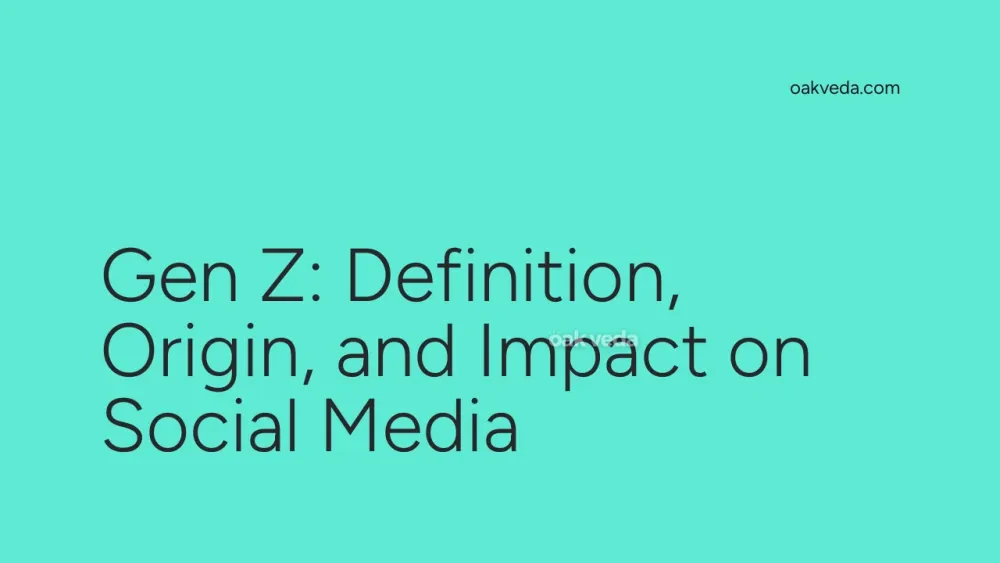
What is Gen Z?
Gen Z, short for Generation Z, refers to the demographic cohort born between the mid-1990s and the early 2010s. As digital natives, this generation has grown up in a world where the internet, smartphones, and social media are ubiquitous. Gen Z is known for their tech-savvy nature, social consciousness, and unique approach to digital communication.
Origin and Development of Gen Z
The term "Gen Z" emerged in the early 2000s as sociologists and marketers sought to define the generation following Millennials. While exact birth years vary depending on the source, most agree that Gen Z includes those born from the mid-1990s to the early 2010s.
As the first generation to grow up with widespread internet access and mobile technology from an early age, Gen Z's development has been significantly influenced by digital connectivity and global information access.
How Gen Z Interacts with Social Media
Gen Z's relationship with social media is characterized by:
- Visual-first communication: Platforms like Instagram, Snapchat, and TikTok are favored for their emphasis on visual content.
- Short-form content: Brief, engaging videos and messages align with Gen Z's preference for quick, digestible information.
- Multi-platform presence: Gen Z often maintains active profiles across multiple social media platforms.
- Privacy awareness: This generation is more conscious of online privacy and often prefers ephemeral content.
- Authenticity: Gen Z values genuine, unfiltered content over polished, corporate messaging.
Popular Social Media Platforms Among Gen Z
- TikTok: Known for short-form video content and viral challenges.
- Instagram: Favored for photo sharing, Stories, and Reels.
- Snapchat: Appreciated for its ephemeral messaging and AR filters.
- YouTube: Used for longer-form video content and educational resources.
- Twitter: Utilized for real-time news and cultural commentary.
Impact of Gen Z on Social Media Culture
Gen Z has significantly influenced social media culture in several ways:
1. Driving Visual Innovation
Their preference for visual communication has pushed platforms to develop new features like Stories, Reels, and interactive AR filters.
2. Shaping Content Trends
Gen Z's appetite for authentic, relatable content has led to the rise of unfiltered, "day-in-the-life" style posts and vlogs.
3. Influencing Platform Development
Social media companies are constantly adapting their algorithms and features to cater to Gen Z's preferences and behaviors.
4. Redefining Influencer Marketing
Micro-influencers and niche content creators often resonate more with Gen Z than traditional celebrities.
5. Promoting Social Activism
Gen Z frequently uses social media as a tool for raising awareness about social and political issues, driving online movements and campaigns.
Controversies Surrounding Gen Z and Social Media
While Gen Z's relationship with social media has many positive aspects, it's not without controversy:
- Mental Health Concerns: Increased screen time and social media use have been linked to higher rates of anxiety and depression among Gen Z.
- Privacy Issues: Despite being more privacy-conscious, Gen Z still faces risks related to data collection and online safety.
- Cancel Culture: The rapid spread of information on social media has led to concerns about online shaming and "canceling" individuals or brands.
- Misinformation: Gen Z must navigate a complex landscape of fake news and misinformation on social platforms.
How Brands and Influencers Engage Gen Z
To effectively reach Gen Z on social media, brands and influencers are adopting new strategies:
- Authenticity: Focusing on genuine, behind-the-scenes content that feels real and relatable.
- Social Responsibility: Aligning with social causes and demonstrating a commitment to positive change.
- Interactive Content: Creating polls, quizzes, and challenges that encourage active participation.
- Micro-Moments: Delivering bite-sized, impactful content that fits into Gen Z's fast-paced digital lifestyle.
- Co-Creation: Involving Gen Z in product development and marketing campaigns through user-generated content and collaborations.
Future Trends Related to Gen Z and Social Media
As Gen Z continues to shape the digital landscape, several trends are emerging:
- Augmented Reality Integration: Increased use of AR in social media for both entertainment and practical applications.
- Social Commerce: The rise of in-app purchasing and seamless shopping experiences within social platforms.
- Niche Communities: Growth of smaller, more focused social networks catering to specific interests.
- Privacy-Focused Platforms: Development of social media apps with enhanced privacy features and data protection.
- AI-Driven Personalization: More sophisticated use of artificial intelligence to curate personalized content feeds.
FAQs about Gen Z and Social Media
-
What age group is considered Gen Z? Gen Z typically includes individuals born between the mid-1990s and early 2010s.
-
How much time does Gen Z spend on social media? On average, Gen Z spends about 3 hours per day on social media, though this can vary widely among individuals.
-
What sets Gen Z apart from Millennials on social media? Gen Z tends to be more privacy-conscious, prefers more visual and short-form content, and is more likely to use social media for activism compared to Millennials.
-
How is Gen Z changing influencer marketing? Gen Z values authenticity and relatability, leading to a rise in micro-influencers and niche content creators over traditional celebrities.
-
What social issues are most important to Gen Z on social media? Climate change, social justice, mental health awareness, and LGBTQ+ rights are among the top issues Gen Z advocates for on social platforms.
Understanding Gen Z's unique relationship with social media is crucial for marketers, educators, and social platforms alike. As this generation continues to grow and evolve, their influence on digital culture and communication will undoubtedly shape the future of social media and beyond.
You may be interested in:
- Repin: Definition, Origin, and Impact on Pinterest
- Ded: Definition, Origin, and Impact on Social Media
- Instagram Algorithm: Definition, Origin, and Impact
- Link in Bio: Definition, Origin, and Impact on Social Media
- Touch Grass: Definition, Origin, and Impact on Social Media
- ION: Definition, Origin, and Impact on Social Media

